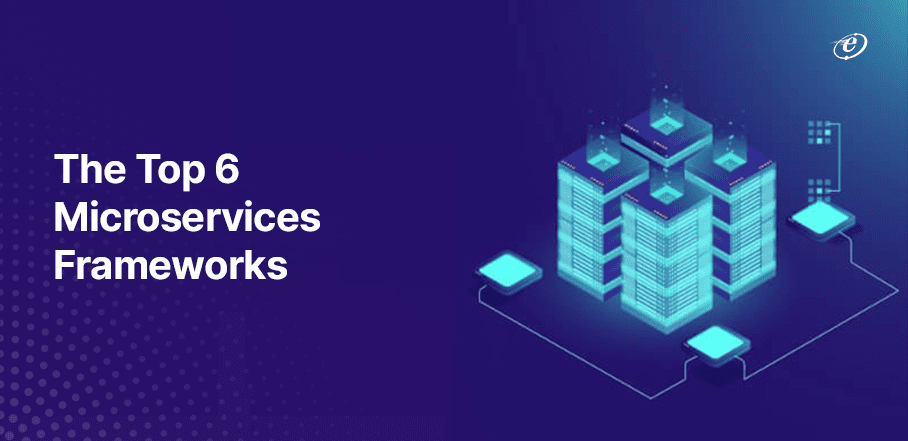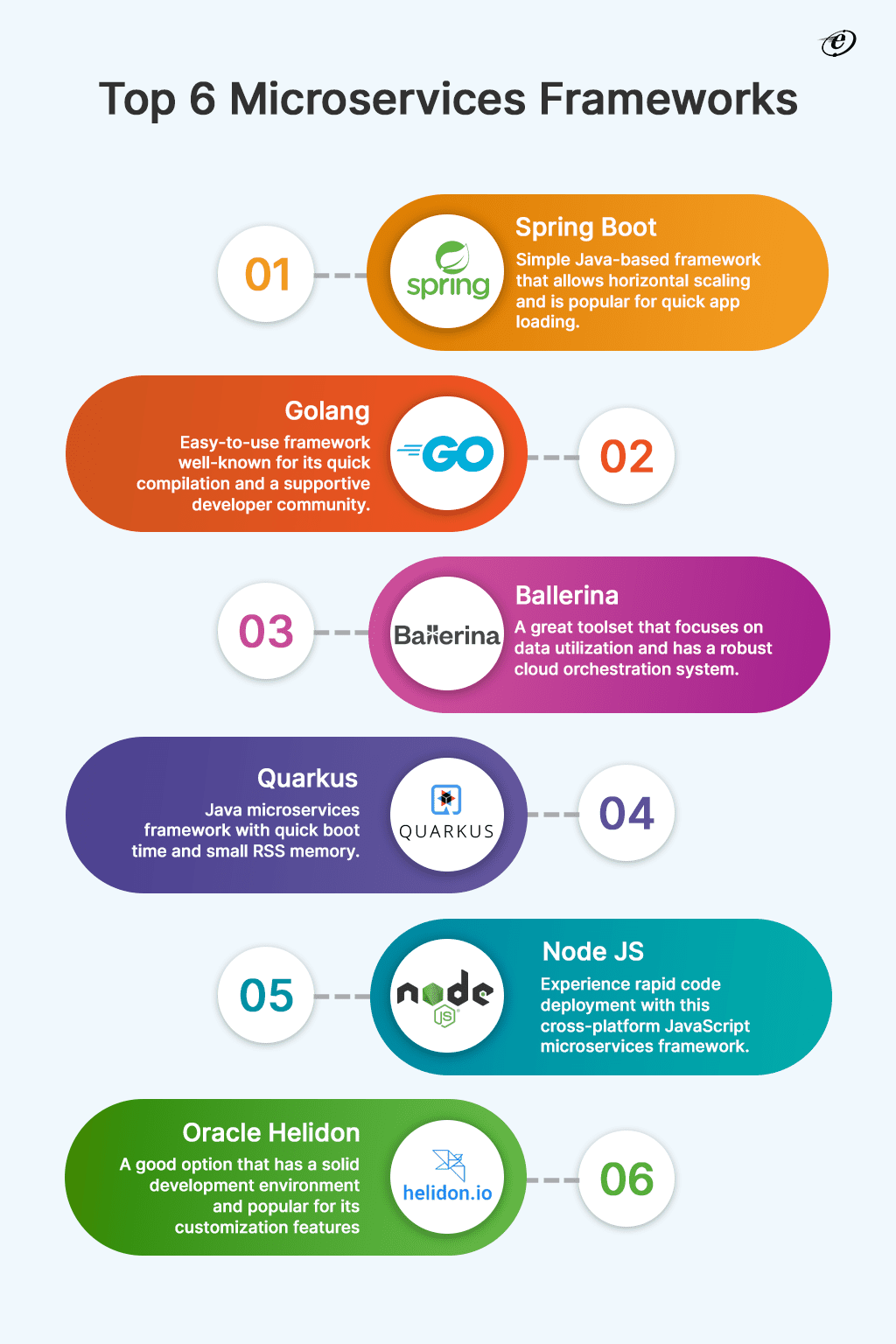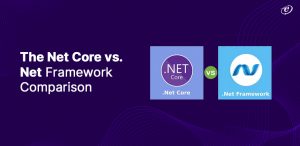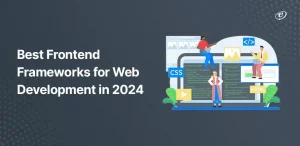A good architecture is crucial for the success of your app development project. To ensure the formulation of this essential asset, you need to choose the best microservices framework.
Amongst developers, the best Java framework for microservices is a main topic of interest. In fact, 34% of developers use Java to build a microservice-based architecture, making it the top-most preference. However, you can also notice frameworks with popular languages like Python, Go, C#, and others.
Plenty of options can lead to a rise in your confusion. So, we are here to assist you in providing a researched list of the top microservices framework. Just scroll ahead to explore some useful options.
Best Microservices Frameworks: Understanding the Basics
Here’s a fact – 94% of professionals using microservices feel this type of architecture is highly important for developing digital products.
Well, there are practical reasons for this popularity.
Microservices emphasize fragmenting an application into smaller parts (or services). Each of these components has its distinct processes. So, even if you change or modify a specific microservice, other functions do not undergo any change.
Choosing the best microservices framework is crucial to notice the following advantages:
- High scalability
- Improved productivity
- High return on investment
- Good data security
- Seamless DevOps support
The most skilled and dedicated developers can make appropriate implementation of a microservices framework. So, you can hire such professionals or leverage using any microservice platform that suits your budget and project requirements.
Understanding Microservices Architecture in Technical Terms
If you are a tech person, knowing about Microservices from a more detailed perspective can be interesting. This architectural style breaks down monolithic applications into smaller, independent services.
Now, each of these services has the following components:
- Logic and data
- APIs for communication
- Independent deployability
The end result? You can create applications that have the following attributes:
- Agility: Develop, deploy, and iterate faster
- Scalability: Scale individual services based on needs
- Resilience: Service failures don’t impact the whole system
Overall, microservices offer a powerful approach to building complex, adaptable applications but require careful planning and execution.
The Best Microservices Framework List to Consider
Without any ado, take a look at the top picks of some notable microservices frameworks for your next IT project.
1. Spring Boot
If you’re looking for the best Java microservice framework, this name will pop up from time to time.
Here are the highlights of Spring Boot:
- First release: 2014
- Developer: VMware
- Avg. Rating: 4.6/5
The remarkable combination of Spring Boot and Spring Cloud helps develop a robust and flexible architecture. You can also launch apps quickly using the Spring Initializer.
Here are the benefits of using Spring Boot, a top name in the best microservices framework list:
- Simple and straightforward integration
- Allows horizontal scaling
- Reduction in development time
- Less dependency on XML configuration
However, you also need to be aware of the limitations of this microservices framework:
- Possibility of increase in deployment binary size
- Time-consuming conversion
- High resource utilization
So, consider these factors while choosing this Java microservice framework.
2. Golang
Familiarity with Go programming encourages many developers to choose Golang as the best microservices framework.
Before understanding its pros and cons, let’s skim the highlights:
- First release: 2009
- Developer: Google
- Avg. Rating: 4.1/5
Now, take a look at the advantages of preferring Golang over other microservices framework:
- It is fast and easy to learn
- The compilation is quick
- Golang is easy to maintain
- The developer community is active
Moving ahead, note the disadvantages of this best microservices framework:
- It has limited library support
- The code is hard to refactor
- Golang has a small community
Overall, Golang is a handy and one of the most popular microservices framework to build applications from scratch.
3. Ballerina
This best microservices framework is a good choice for developing distributed systems. It is open source, cloud-native, and offers more freedom for developers to build exceptional service interfaces.
Take a look at the highlights of this framework:
- First release: 2017
- Developer: WSO2
- Avg. Rating: 4.3/5
Ballerina is a data-oriented microservices framework. You can integrate CI/CD tools that make it essential to build customized applications.
Here are the advantages of this framework for you to consider:
- Asynchronous interaction language
- Cloud orchestration system
- Easy to learn
- Possess visual representation tools
However, you also need to take some limitations of this framework into consideration:
- Data-oriented language
- Comparatively new on the IT scene
This microservice framework is unique. So, you need to discuss its utility with dedicated developers who have in-depth knowledge of building top-performing apps.
4. Quarkus
This is a prominent name in the best Java framework for microservices list.
Quarkus has the following highlights:
- First release: 2019
- Developer: Red Hat Software
- License: Apache 2.0
This full-stack microservices framework is well-known for its reactive programming paradigm.
It offers the following advantages:
- Minimal RSS memory
- Fast boot time
- Improved application performance
- Numerous frameworks and APIs
On the contrary, Quarkus has some disadvantages that you should consider:
- Insufficient RSS memory
- High memory use requirements
Notably, Kubernetes enthusiasts endorse this best microservices framework. So, Quarkus can be a good option to implement an impulsive programming approach, making it a popular microservices framework java term.
5. Node JS
You can even build microservices with Node.js, a popular cross-platform JavaScript environment. For this purpose, frameworks like Express.js, Hapi, and Feathers can prove helpful.
Here are the highlights of this microservices framework:
- First release: 2009
- Developer: OpenJS Foundation
- Avg. Rating: 4.8/5
You can hire dedicated Node.js developers who utilize JavaScript libraries for building a microservice architecture.
The benefits of this technology are as follows:
- Single-threaded approach
- Simple incoming request management
- Quick code deployment
- No buffering of data
On the other hand, certain limitations of this microservices framework can prove unsuitable for some projects.
Here are the main ones:
- Chances of network delays
- Backward incompatibility
- Limited library support
Overall, you need proficient technicians to implement the Node.js microservice architecture. So, ensure you have a suitable workforce to include Node.js in your strategy and benefit from the advantages.
6. Oracle Helidon
If you want a lightweight microservices framework, Helidon is a good option. It is popular due to its open-source nature, user-friendliness, and cloud-native declarative programming paradigm.
Take a look at the highlights of Oracle Helidon, a considerable name in the best microservices framework list:
- First release: 2019
- Developer: Oracle
- Avg. Rating: 4.3/5
You can explore two variants of Oracle Helidon (MP and SE) to develop microservices.
Here are the advantages of choosing this Java microservice framework:
- All-inclusive cloud environment
- Customizable for programming needs
- Small or minimal starting time
- Small memory footprint
Like other microservices frameworks, you should know this option’s disadvantages.
Here are the main ones:
- Lack of adequate documentation
- Challenging to find solutions on Stack Overflow
Relatively new to the market, Oracle Helidon still shows promising signs of becoming the best microservices framework. Still, you need to choose the most suitable option that meets your project requirements. Connect with experienced developers to pick the best choice.
In a Nutshell
Modern applications built using the best microservices framework can become more reliable, fast, and ergonomic. Different development teams can modify the required component in a microservice architecture without changing the source code.
At this time, you can find a microservice framework that fits your development requirements profoundly. However, the market has numerous frameworks that can make the task of choosing the top one a tad challenging.
You can always rely on this list to choose the best microservices framework. Also, there are only six options that can reduce the confusion to choose the most apt choice. To get more customized advice, you can also connect with our experts. So, ensure that you make the right choice and initiate building your tailor-made microservices framework today!
Here’s the YouTube link for you to understand better about The Best Microservices Framework.
Frequently Asked Questions
Is microservices a framework or technology?
Microservices is neither a framework nor a technology. It is an architectural style for building software applications. This approach involves structuring an app as a collection of independent services communicating with each other.
Which framework is best for microservices?
There is no single ‘best’ framework for microservices. Still, you can use various frameworks like Spring Boot (for Java) and Express.js (for JavaScript), depending on your project requirements. Flask and ASP.NET core are some popular options in this category.
Excellence-driven professional with 15+ years of experience in increasing productivity, and revenue, while effectively managing products of all sizes. He has worked for international clients in the US, UK, and Singapore and local companies in various domains. With excellent attention to detail and a methodical approach to execution, he is an expert in bringing projects to a successful stage. He follows James Humes’s famous saying- “The art of communication is the language of leadership.”











